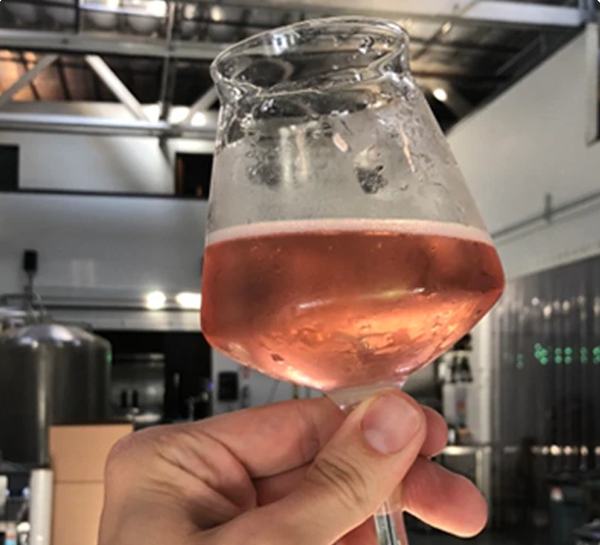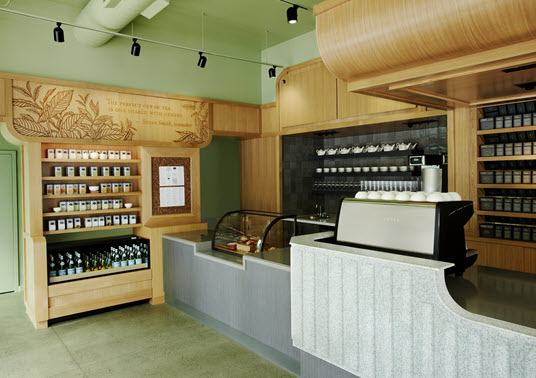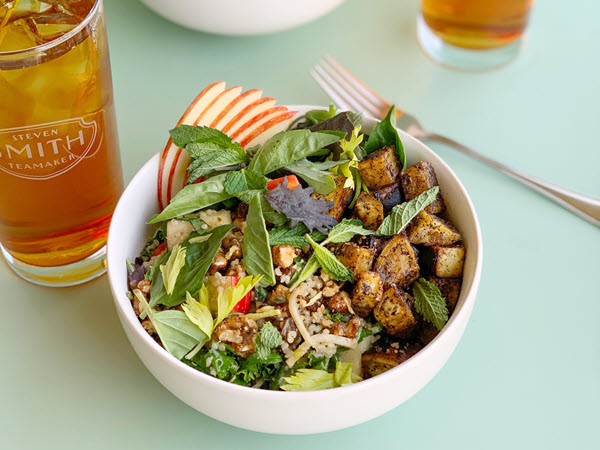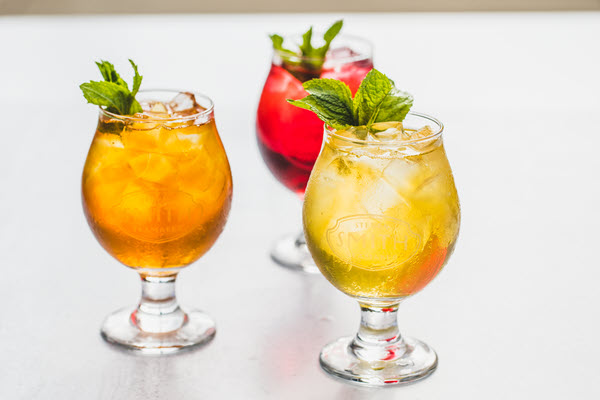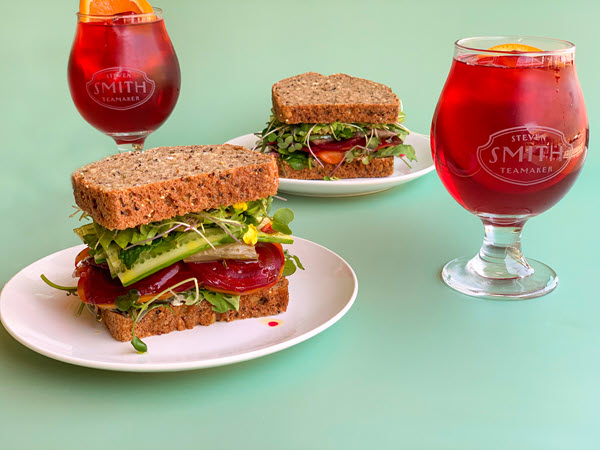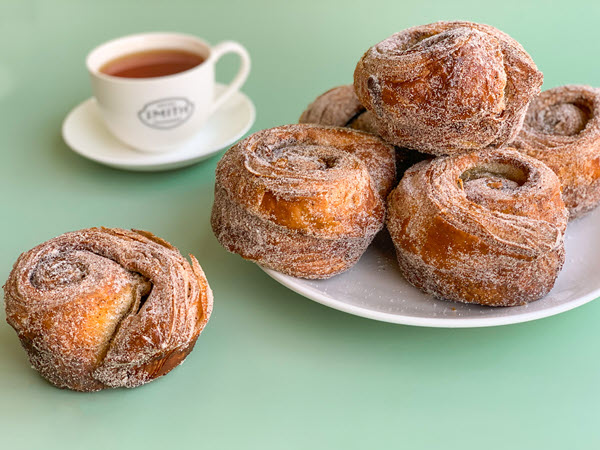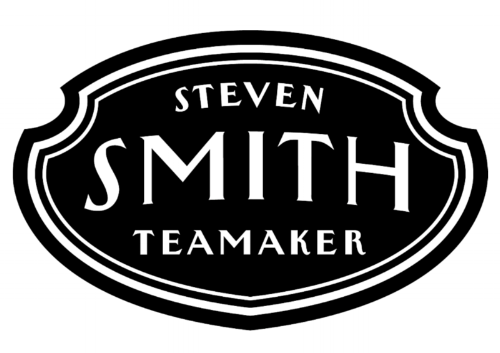Sparkling tea is on a trajectory akin to small-batch, craft-brewed beer where carefully selected ingredients are individually prepared to showcase their best characteristics. Recipes emphasize balance, with efficacy and taste foremost. Excellence in blending and brewing preserves high concentrations of polyphenols and other beneficial plant compounds with minimum calories, nothing artificial, the convenience of cans – and the fun of fizz.
Listen to the interview:

Healthful Effervescence
Jeff Champeau, vice president of business development at Rishi Tea & Botanicals in Milwaukee, Wis., explains that marketing seasonality is a great way to introduce craft-brewed tea into our lives.
Dan Bolton: Jeff, is fizzy tea destined for mainstream consumption? Will authentic craft-brewed, plant-based, low-sugar, lightly carbonated genuine teas and herbal infusions overcome barriers to distribution to become a significant revenue source for the beverage industry?
Jeff Champeau: Absolutely. And that is something that all of us in the tea industry around the world should be proud of and should celebrate. This is like coming home. This is a very exciting time to seesugared soft drinks, sodas and beverages being something people are turning away from en masse. They’re looking for more healthful alternatives. It is an awesome trend. Tea has been around for 5,000 years, it’s resilient, and there’s a reason for it. Tea speaks to our soul. It’s healthful. It enlightens us. It’s one of the most ancient plants that people have ever been connected to. And it’s about time that it hasmuch of the consumer market paying attention. It’s so delicious you don’t need sweetener to appeal to the everyday palate, the everyday consumer out there.
Dan: Breaking the sugar habit appears to be a primary driver of sales.
Jeff: If you’re using high quality ingredients, if you’re using skillful blending techniques you can deliver a very interesting complex taste without added sweeteners. That’s something that people can really feel deeply refreshed by ? not just satiated. Something that tastes good that scratches that itch to refresh my palate after food.
Soda may satiate them in the moment, but you can’t have two or three or four of them without feeling it in your belly. Something that really has the kind of cleansing hydrating effect of sparkling tea — that’s something you can really feel refreshed by and drink several. That’s what we sought to achieve with the sparkling botanicals.
Dan: Tell me more about the characteristics of the new line.
Jeff: Our sparkling botanicals are brewed using real plants to deliver real virtue. They’re the same super premium direct trade botanicals and teas that we use in our loose leaf and sachet tea blends, many of which are certified organic.
We microbrew them using proprietary brewing techniques to yield a really balanced and craft brewed tea that is sparkled up with a carbonated water.
Using rare citrus and achieving a unique balance with teas with herbs, botanicals, spices, were able to develop, a two-year shelf life product with no added sugar, no added sweeteners of any kind, nothing artificial, only zero to two grams of sugar per can, using real infused fruits like berries or citrus.
And these offer only 5 to 15 calories, which is really speaking to the fact that they have real plants.
It all comes down to that part of the balance. You’re getting the balance of the polyphenols, the tannins that are extracted, whether that’s from tea leaves or from of the super fruit botanicals and fruits that we’re using in some of the profiles.
We have six tasty profiles, with two more scheduled to be introduced online later this year for distribution next spring. Our MSRP is from $2.99 to $3.49 per 12-ounce can. Ordered online a 12-pack sells for $40. Subscribers pay $36.

Dan: Will you describe the functional plant-based ingredients in these blends.
Jeff: The Schisandra Berry from Northeast China is just amazing. It is an adaptogen that helps the body regulate physical and mental stress. It is used in traditional Chinese and Korean medicine. It’s also been used for centuries as a beauty tonic, to detox the liver, to maintain healthy skin and even an aphrodisiac.
It is called the five-flavor fruit. The outside of the fruit is a little bit salty, the flesh is sweet and tart in a nice balance. The pit is bitter and pungent and a little spicy. It is a mood booster said to deliver energy to the five meridians and to balance chi. It has an amazingly refreshing character with a color like a sparkling rosé.
- Schisandra Berry – An adaptogenic elixir crafted from a single ingredient: forest grown schisandra berry.
- Turmeric Saffron – This is a blend of tangy Golden Berries from the Amazon, lush California lemons and fragrant saffron, the most expesive spice in the world. The ingredients are steeped with forest-farmed turmeric from Burma and jungle-grown green cardamom from Guatemala. The saffron delivers an amazing hue to the infusion. You can really see that there are real plants used to make these drinks.
- Black Lemon – Black lemon is a high caffeine blend of black tea from from Northern Thailand with a combination of California dried lemon and black lemon from Guatemala. The Guatemala lemon uses an ancient Persian technique to ripen and oxidize the the lemon – a kind of food preservative. It has a bright, citrusy flavor with a malty finish. There are about 50 milligrams of caffeine per can.
- Dandelion Ginger – My personal favorite contains dandelion root for detox and ginger. It is an anti inflammatory blend that also features a really cool type of tea called Kuro Koji, which is a Japanese green tea that’s fermented with the Koji yeast that’s used in fermented foods. The dandelion root is roasted and the ginger we use is prized for its pungency, aroma, and spiciness. The combination is craft brewed and combined with red chili and detox tonic herbs. It’s like a ginger beer with zero added sugar that offers satisfying depth and heat.
- Grapefruit Quince – This blend elevates everyday replenishment with juicy hibiscus, aromatic yuzu and succulent quince. We were inspired by traditional Korean herb teas that feature quince to soothe and support easy breathing. Hibiscus is enjoyed throughout the tropics for refreshing, cooling energy and is widely regarded to help lower blood pressure, promote arterial health and support metabolism.
- Patagonia Maqui – Wild-foraged maqui berry stimulates the palate with accents from red wine grape skins and forest berries to create a sophisticated flavor with an almost wine-like profile. Maqui berries are a prized source of antioxidants like anthocyanins and have been traditionally used by the people of the Patagonia for vitality and cleansing. The Maqui berry is harvested from the Patagonia region of Chile. It brings to life different kinds of health functions that are derived from a variety of ingredients. This one is great on the way to work, at mid-morning break or as something to go with lunch that offers a little caffeine to support digestion. At the dinner table it can be served as an alternative to wine.
Dan: Will Camellia sinensis or herbal infusions win the race for market share?
Jeff: I think herbals will lead in North America, there’s a greater variety and different colors, different levels of tartness, ingredients that appeal to the younger drinkers that are maybe newer to the category, but I don’t think that means that we should refrain from using real tea and in developing the lines out further.
Dan: How will tea companies win over the hearts and minds of consumers with respect to the healthful benefits of tea?
Jeff: Tea is part of a broader natural products industry in North America, and I think sometimes what we get wrong in the natural products industry is the too much hype around a particular tea or a particular botanical or herbal ingredient. Being on trend can be exhausting for the consumer. It can treat tea and herb like fashion. Tea isn’t fashion, but that kind of misses the real charm of tea. Tea is not fashion. It’s ancient food and medicine.
Tea can connect us to the rhythms of nature and to the planet. It can access to people far and wide; the growers, the plucking teams, the artisans, and leaf processing teams, the worldwide traders and promoters of tea, the baristas, the grocery merchants, the consumers. But how can farmers and producers be sustained if their particular crops are hot in the market for two years, only to slow down as some other trends takes off?
So, I think the question is, how do we how we choose to market tea and botanicals in a way that really encourages a deep and steady and earnest interest into infusing tea into our lives.
Tea is an agricultural product. It has these different waves of the harvest that come throughout theseasons. Year to year those,harvests are going to fluctuate naturally as mother nature gives us what she can.
If you ask most tea professionals, what’s their favorite tea, most will likely tell you what their favorite tea is, at that moment, because they’re plugged in to the harvest calendar, they’re tracking with what’s fresh and in season.
Botanicals have their own harvest seasons and new areas of cultivation. If we cultivate a seasonal approach and recognize that, tea, herbal teas, botanical spices, a part of our broader choices in diet and in what we choose to consume.
It’s good that we introduce variety into our diet. And it’s good that we introduce variety into our tea habits, too, and embrace that seasonal rhythm of the harvest.
We have an opportunity to really cultivate a dynamic tea culture in North America that celebrates the seasonality of tea. Not every tea is going to be consistent. There’s a beauty in the variety and some of that unexpected that can come year to year and season to season. And we should have a reverence for the tea traditions, connecting us to the deeper philosophy of tea. But we should also feel a sense of creative freedom to draw inspiration from those traditions to offer the North American market new and exciting ways to infuse tea into their lives.
In doing so we’re going to open up their minds to thinking about tea as something that they choose to drink and enjoy on the daily basis, maybe at some different occasions than we might expect.
This interview has been edited and condensed.

Sparkling Botanicals
“We want to focus the passion and creativity of Rishi’s amazing team on something totally new and exciting — something that honors our enduring relationships with farmers and tea drinkers while transcending our core business of dried teas and botanicals. As a selector, importer and taste maker, our natural progression is to make beverages with teas and botanicals that are ready to drink. People love our teas but have less and less time to brew them. Tea drinkers are moving to bottled and canned teas to save their time but have few options that offer premium botanicals and high-end teas brewed without added sugar, sweeteners or acidic preservatives. Our new line of Sparkling Botanicals elevates RTD with craft brewing and meets this demand for real plants with real virtue.”
-Joshua Kaiser, founder of Rishi Tea & Botanicals
Rishi Tea & Botanicals
185 S. 33rd Court
Milwaukee, WI 53208
(414) 747-4001
Share this post with your friends in tea.
Signup and receive Tea Biz weekly in your inbox.
Never Miss an Episode
Subscribe wherever you enjoy podcasts:

